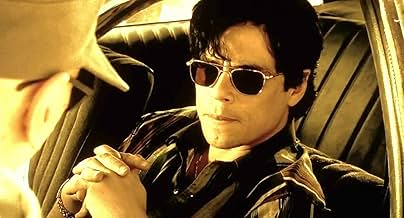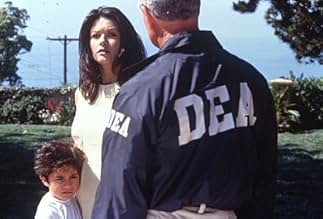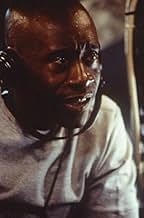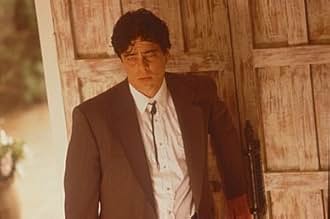Un giudice conservatore viene nominato al comando della guerra sempre più crescente dell'America contro le droghe, ma scopre che la figlia teenager è una tossicodipendente. Due agenti della ... Leggi tuttoUn giudice conservatore viene nominato al comando della guerra sempre più crescente dell'America contro le droghe, ma scopre che la figlia teenager è una tossicodipendente. Due agenti della DEA proteggono un informatore. La moglie di un barone della droga tra le sbarre cerca di p... Leggi tuttoUn giudice conservatore viene nominato al comando della guerra sempre più crescente dell'America contro le droghe, ma scopre che la figlia teenager è una tossicodipendente. Due agenti della DEA proteggono un informatore. La moglie di un barone della droga tra le sbarre cerca di portare avanti l'attività di famiglia.
- Regia
- Sceneggiatura
- Star
- Vincitore di 4 Oscar
- 73 vittorie e 86 candidature totali
- Salazar Soldier
- (as Jose Yenque)
- …
Recensioni in evidenza
Based on the channel 4 series Traffik this is an open-minded intelligent look at the war on drugs. Looking at the problem across several interlinking stories allows us to hear everyone's side to see the internal problems in Mexico, to see the futility of the DEA's actions even to see the scope of the problem facing the US political machine as it tries to fight a war against the drugs trade on all sides. The stories are told with out over doing it action happens without pomp or fanfare, explosions happen in silence, killings are brutal, swift and final. This is not an action movie. The thoughtful nature means the film moves slowly and, if you're not used to following stories then it may frustrate you. However those wishing something to get you thinking, during and after the film should be rewarded.
The film is intelligent far beyond the subject matter. The direction and editing is perfect. The scenes in Mexico are all yellow and washed out giving a desolate feeling, the scenes in political America are given a blue hue to give a colder, detached feel to the business while the scenes with the DEA are noticeably bright and realistic. This is typical of the intelligence put into the film it rewards you the more you watch it. The casting is another example of how right the film is.
Del Toro is perfect he gets the moodiness spot on but also has a fun side to his character. Cheadle and Guzman are as good as they always are and play off each other well they have an element of the `buddy cop' couple without becoming caricatures. Douglas is really good how often can you say that!? His young wife is also very good I expected her to be the weak link but she gave a good performance. These are the main players but really the cast is deep in quality from those that have bigger roles (Quaid, Bratt, Miguel Ferrer) to those that essentially have only a few lines (Albert Finney, Peter Riegert).
The strength of the film is that it lets you work it out yourself. It never goes one way or the other on the drugs issue and leaves you to decide for yourself what should happen. This is rare in an `issue' film and it should be commended. The film allows long silences for us to think but yet is never boring or dull.
Overall this is a really good film. It is shorter and more polished than the mini-series it came from, but it is very intelligently done and is though-provoking. Anyone who thinks they are sure of their stance on drugs should watch this no matter what you think this will highlight the fact that it is a complex problem to which there is no simple solution. Excellent.
Stylistically, this film represents a major breakthrough. Soderbergh shot the film himself (under the pseudonym Peter Andrews) and Traffic takes all of his past experiments with color, available light, and hand-held work light-years beyond The Limey and Out of Sight. He has created a brilliant style that could best characterized as expressionistic naturalism. His loose hand-held style lends the film an extremely spontaneous realistic tone, but the modifications of color amplify the drama. Each storyline has its own distinct look that accentuates the emotions underlining the film. (The Mexico story involving Benicio Del Toro is told in earthy saturated yellows, the story of Michael Douglas and his daughter Erika Christensen is told in an aquarium blue, while the Catherine Zeta-Jones, Luis Guzman-Don Cheadle story gets a natural available light look). In addition to being visually striking and cool in a completely unpretentious manner, Soderbergh's camera technique transcends mere virtuosity and actually becomes another character in the film. As usual with Soderbergh, the film is edited with musical verve and skill, where time is collapsed and expanded, and characters are seen reflecting on past actions.
I've been remiss in not discussing the acting earlier. This film has an amazing ensemble cast where everybody is working at the top of their game. However, Benicio Del Toro definitely stands out with the breakthrough performance. I don't think it's accidental that the movie begins and ends with shots of him. He plays Javier Rodriguez, a Mexican police officer caught in a futile and corrupt system, and it's as compelling of a character as Michael Corleone. Del Toro is exceptionally relaxed and subtle, keeping his thoughts and feelings private from the other characters in the films, but sharing it with the camera. Del Toro navigates the audience through a world of impossible choices and moral corruption, quietly simmering with intense conflict just beneath the surface. Benicio's been an indie stalwart for years, but this film should shoot his stock through the roof. If there's justice in this world, he'll be rewarded with Best Actor Awards aplenty.
Michael Douglas is also terrific, adding another strong performance to his gallery of flawed men in power. He shows genuine fear and vulnerability in a harrowing scene in which he searches for his daughter in a drug dealer's den. I've never seen Erika Christensen before, but she makes an impressive debut. Don Cheadle and Luis Guzman (they should star as a team in every movie!) are as loose, limber and spontaneous as ever, providing plenty of comic relief as well as keeping it real. Catherine Zeta-Jones takes a complete 180 from her past roles and admirably plays against her looks, appearing very pregnant while thrown into gritty surroundings. Dennis Quaid is appropriately slimy as a corrupt lawyer.
Anyway, film geeks and anybody else starved for a genuine piece of filmmaking should breathe a sigh of relief and give thanks that Soderbergh has come to save the day.
That the war on drugs cannot be won, and is hypocritical to boot, is a message that needs as much air-time as it can get.
Lo sapevi?
- QuizThe scene in which Michael Douglas takes his trip to the California border crossing to discuss drug interdiction was actually shot at the Tijuana crossing. The video and sound quality are so low in part because it wasn't intended to be part of the movie. Douglas, out of character, started asking Rudy M. Camacho about drug trafficking on the border. At the time, Camacho was the real-life Customs chief in charge of the California border crossings. Steven Soderbergh began filming it with a hand-held camera, praying that Camacho wouldn't address the actor as "Mr. Douglas".
- BlooperFrancisco Flores has distinctive wounds on his left cheek and forehead when first shown in surveillance photos, but those wounds are only visible after he is tortured by General Salazar's men, long after the photos were taken.
- Citazioni
General Ralph Landry: You know, when Khruschev was forced out, he sat down and wrote two letters and gave them to his successor. He said - "When you get yourself into a situation you can't get out of, open the first letter, and you'll be safe. When you get yourself into another situation you can't get out of, open the second letter". Well, soon enough, this guy found himself into a tight place, so he opened the first letter. Which said - "Blame everything on me". So he blames the old man, it worked like a charm. He got himself into a second situation he couldn't get out of, he opened the second letter. It said - "Sit down, and write two letters".
Robert Wakefield: [laughs] Yep.
- Curiosità sui creditiThere are no opening credits except for the film's title in the lower left corner.
- Versioni alternativeThe Criterion Collection DVD is presented in 1.85:1, whilst the Criterion Blu-ray is presented in 1.78:1. According to the Blu-ray insert, the latter is the director's preferred ratio.
- Colonne sonoreGive The Po' Man A Break
Written by Fatboy Slim (as Norman Cook)
Performed by Fatboy Slim
Courtesy of Astralwerks Records
I più visti
- How long is Traffic?Powered by Alexa
- Who was Arnie Metzger?
- What is the mixture sprayed into Frankie Flowers face while he's held captive?
- What is it that Gordon attaches to the table in Ayala's house towards the end of the film?
Dettagli
Botteghino
- Budget
- 48.000.000 USD (previsto)
- Lordo Stati Uniti e Canada
- 124.115.725 USD
- Fine settimana di apertura Stati Uniti e Canada
- 184.725 USD
- 31 dic 2000
- Lordo in tutto il mondo
- 207.515.725 USD
- Tempo di esecuzione2 ore 27 minuti
- Colore
- Mix di suoni
- Proporzioni
- 1.85 : 1





































